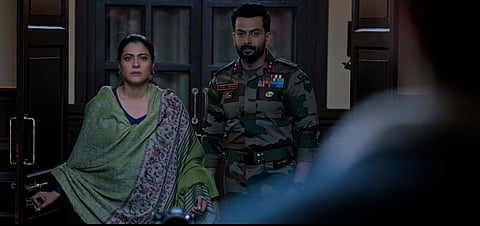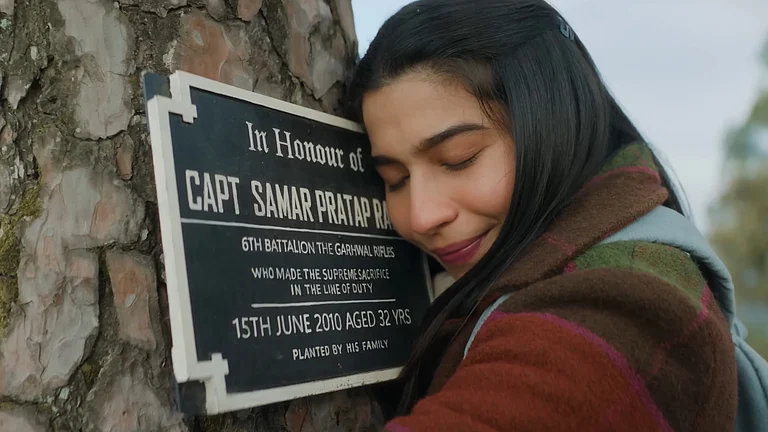How does the industry approach the launch of Ibrahim Ali Khan (IAK), the son of Saif Ali Khan—who named one of his other sons Taimur in 2016 and sparked massive outrage from right wing ideologues and whose show Tandav (2021) was mired in an equally absurd controversy? In other words, how does Dharma Productions chart the graph of a young Muslim man with privilege and a substandard acting debut with Nadaaniyan (2025)? Interestingly, he appears in a film where his religious identity is not concealed and his character does not adhere to traditional notions of goodness. In a polarised India, toying with the beliefs of dominant political groups by placing IAK’s character at the threshold of State and anti-State could have been interesting, if the film evoked any feeling or inspired more curiosity.
Sarzameen Review: Ibrahim Ali Khan, Prithviraj And Kajol Starrer Stirs Little Curiosity, No Feeling
Afraid of being political, Kayoze Irani's latest film, released on JioHotstar, hesitates to explore what it means for a young man to have a complicated heritage as the child of a military father and a militant mother.
Kayoze Irani’s Sarzameen initially positions itself as another film set in the Kashmir Valley—one that is interested in solidifying the nation’s military apparatus and deeply disinterested in the concerns of the people. The father, Vijay Menon (Prithviraj Sukumaran), is an old-school army man, who once had an even older-school military father, Sreeram Menon (Anurag Arora) posted in Kashmir, tasked to track a person named Mohsin. Vijay is ashamed of his son Harman’s (Ronav Parihar/Ibrahim Ali Khan) stuttering, an inconvenient attribute of the son of a “strong” army man. Yet, the film quickly abandons this patrilineal centralising of the army to focus instead on the relationship between the father and the son.

Harman gets kidnapped by militants. In exchange for his son’s life, the militants ask Vijay to release two of their companions—Qabil and Aabil. Unable to see through this barter, Vijay’s doctrine of putting one’s nation above everything overwhelms him, and he shoots Aabil dead while Qabil survives. In the course of the film, Vijay’s patriotic doctrine comes under increasing pressure from not only Meher (Kajol), the mother, but also from the pathos of Harman, who struggles to grapple with his father’s sternness and indifference.
Harman’s transformation into Haaris, through his training and participation in the militancy, remains symbolic primarily. Irani’s film largely steers clear of registering any political danger from Harman becoming Haaris; instead, an impulse for patricide drives Haaris’s pursuit. Afraid of being political, the film hesitates to see what it means for a young man to have a complicated heritage in being the child of a military father and a militant mother. Kashmir, as a backdrop, adds no real meaning to the film—perhaps, it serves as bait for certain sections of the audience to tune into JioHotstar, anticipating a “nationalist tale.” While the word “terrorist” is neither employed nor religiously manipulated here, the film does not go so far as to imbue the charge of ambivalence in the category through Harman’s radicalisation.

It is best to see Sarzameen not as a political drama, but as a fable. Mohsin exists as a spectre. Anyone fulfilling a particular mission, the film tells us, is a mohsin; the Urdu/Arabic word translates to “benefactor” or “helper”. Qabil and Aabil—or their biblical counterparts, Cain and Abel—supply a mythological subtext to the film, rather than serving as terrorist archetypes. Aabil, though, is not murdered by Qabil here; their ill-fated brotherhood is marked from the very beginning of the film.
However, this universal, mythical tale of the fate of a fractured brotherhood, coupled with Harman’s subliminal desire to overthrow his father’s power, is so unexplored by Irani that it seems he surrenders his film to the mercy of the symbolic. Vijay is as sketchily written as Meher, and therefore Haaris’s motivations to avenge the killing of Harman (his own younger self by the father) seem to exist in a vacuum. If Sarzameen had ended with the trio dead, it could have at least opened up the radical possibility of nihilism in the wake of military, militancy, and mythos in Kashmir, obliquely hinting at the force of the territory’s political history in exterminating an entire family.
Srishti Walia is a doctoral student of Cinema Studies at the School of Arts and Aesthetics, Jawaharlal Nehru University, New Delhi.
